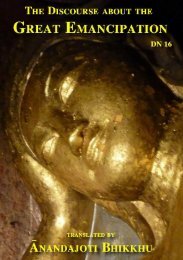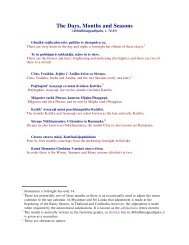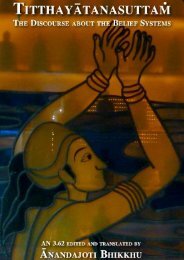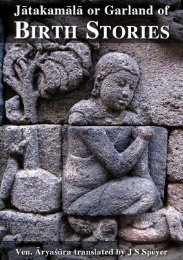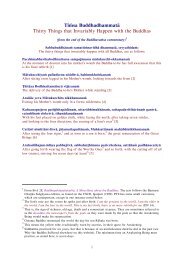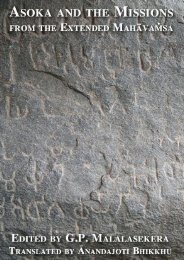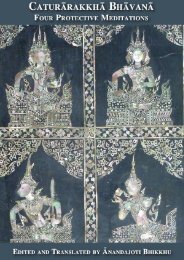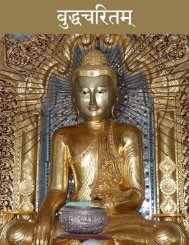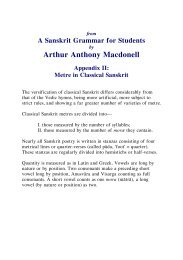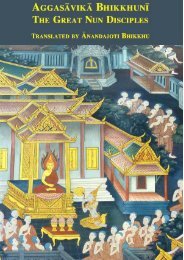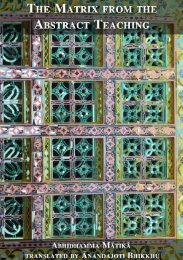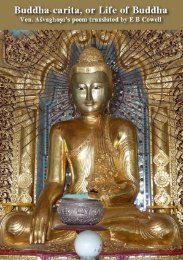The Fourth Discourse of the Buddha - Ancient Buddhist Texts
The Fourth Discourse of the Buddha - Ancient Buddhist Texts
The Fourth Discourse of the Buddha - Ancient Buddhist Texts
You also want an ePaper? Increase the reach of your titles
YUMPU automatically turns print PDFs into web optimized ePapers that Google loves.
<strong>The</strong> <strong>Discourse</strong> on Arising and Ceasing - 2[Utpadyananirudhyanasūtram] 1[<strong>The</strong> <strong>Discourse</strong> on Arising and Ceasing]Introduction 2Atha khalu Bhagavāṁ Magadheṣu cārikāṁ caramāṇo<strong>The</strong>n <strong>the</strong> Gracious One while walking on walking tour amongst <strong>the</strong> Magadhansmahatā Bhikṣusaṁghena sārdham-ardhatrayodaśabhir-bhikṣuśataiḥ,with a great Community <strong>of</strong> Monks, with one thousand two hundred and fifty monks,yena Magadhānāṁ Rājagṛhaṁ nagaraṁ tad-anusāri,entered <strong>the</strong> town <strong>of</strong> Rājagṛha <strong>of</strong> <strong>the</strong> Magadhans,tad-anuprāpto tatraiva viharati antagirismiṁ Yaṣṭīvane udyāne.and having reached <strong>the</strong>re he lived in <strong>the</strong> Sapling garden wood on <strong>the</strong> edge <strong>of</strong> <strong>the</strong>mountain.Aśroṣīd-Rājā Śreṇiyo Bimbisāro brāhmaṇasya purohitasya Rājācāryasya:King Śreṇiya Bimbisāra heard from his brāhmaṇa chaplain and royal teacher:“Bhagavāṁ kila Magadheṣu cārikāṁ caramāṇo“<strong>The</strong> Gracious One, it seems, while walking on walking tour amongst <strong>the</strong> Magadhansmahatā Bhikṣusaṁghena sārdhaṁ trayodaśabhikṣuśatairwitha great Community <strong>of</strong> Monks, with one thousand two hundred and fifty monks,yena Magadhānāṁ Rājagṛhaṁ nagaraṁ tad-anusāri,has entered <strong>the</strong> town <strong>of</strong> Rājagṛha <strong>of</strong> <strong>the</strong> Magadhans,tad-anuprāptas-tatraiva viharati antagirismiṁ udyāne Yaṣṭīvane.”and having reached <strong>the</strong>re he is living in <strong>the</strong> Sapling garden wood on <strong>the</strong> edge <strong>of</strong> <strong>the</strong>mountain.”Śrutvā punaḥ anyataraṁ Rājāmātyam-āmantrayasi:After hearing (it) he addressed a certain King’s Minister (saying):“Bho bhaṇe Amātya Bhagavato <strong>Buddha</strong>sya pratyudgamanaṁ gamiṣyāmi.“Good Minister, I am going out to meet <strong>the</strong> Gracious One, <strong>the</strong> Awakened One.1 This title is given by <strong>the</strong> present translator based on <strong>the</strong> contents on <strong>the</strong> discourse. It alsooccurs in <strong>the</strong> Saṅghabhedavastu <strong>of</strong> <strong>the</strong> Mūlasarvāstivādins, contained in <strong>the</strong> Gilgitmanscripts, and recently Rod Bucknell informed me that it is also preserved in <strong>the</strong> Chinesein Sūtra 62 <strong>of</strong> <strong>the</strong> Sarvāstivādin Madhyamāgama, where it is called 頻 鞞 娑 邏 王 迎 佛 (KingBimbisāra welcomes <strong>the</strong> <strong>Buddha</strong>).2 <strong>The</strong> story in <strong>the</strong> Introduction is parallel to <strong>the</strong> story in <strong>the</strong> Pāḷi Mahākhandhaka, but withsome extra details not found <strong>the</strong>re.
<strong>The</strong> <strong>Discourse</strong> on Arising and Ceasing - 4Atha khalu sa Rājāmātyo saṁnipatitaṁ janakāyaṁ viditvā bhadrāṇi yānāniyojāpayitvā,<strong>The</strong>n <strong>the</strong> King’s Minister, after seeing that <strong>the</strong> people had assembled, <strong>the</strong> magnificentvehicles had been made ready,yena Rājā Śreṇyo Bimbisāras-tenopasaṁkramitvā,and approaching King Śreṇya Bimbisāra,Rājānaṁ Śreṇiyaṁ Bimbisāram-etad-avocat:said this to King Śreṇiya Bimbisāra:“Yuktāni Mahārāja bhadrāṇi yānāni mahājanakāyaṁ ca sannipatitaṁ,“<strong>The</strong> magnificent vehicles have been made ready, Great King, and a great body <strong>of</strong>people have assembled,yasyedāni Deva kālaṁ manyasi.”now is <strong>the</strong> time, your Majesty, for whatever you are thinking.”Atha khalu Rājā Śreṇyo Bimbisāraḥ bhadraṁ yānam-abhiruhitvā,<strong>The</strong>n King Śreṇya Bimbisāra, after mounting a magnificent vehicle,Māgadhakehi brāhmaṇagṛhapatikehi sārdhaṁ dvādaśehi nayutehi saṁparivṛto,surrounded by twelve myriads <strong>of</strong> brāhmaṇas and householders from Magadha,mahatā Rāja-ṛddhīye mahato janakāyasyawith great Royal power and a great body <strong>of</strong> peoplehakkārahikkārabherīmṛdaṁgamarupaṭahaśaṁkhasaṁninādena,who were calling and shouting, with <strong>the</strong> collective noise <strong>of</strong> drums great and small,and conches,Rājagṛhāto nagarāto niryātvā yena antagirismiṁ Yaṣṭīvanam-udyānaṁ tenaprayāsi.went out from <strong>the</strong> town <strong>of</strong> Rajagṛha and to <strong>the</strong> Sapling garden wood on <strong>the</strong> edge <strong>of</strong><strong>the</strong> mountain.Atha khalu Rājā Śreṇyo Bimbisāro yāvad-eva yānabhūmis-tāvad-eva yānenayātvā,<strong>The</strong>n <strong>the</strong> King Śreṇya Bimbisāra, having gone as far as <strong>the</strong> ground for vehicles(would allow),yānāto pratyoruhya padasā yeva yena Bhagavāṁs-tenopasaṁkramitvā,and descending from <strong>the</strong> vehicle, approached <strong>the</strong> Gracious One by foot,
<strong>The</strong> <strong>Discourse</strong> on Arising and Ceasing - 5Bhagavataḥ pādau śirasā vanditvā ekānte niṣīdet,and after worshipping <strong>the</strong> Gracious One’s feet with his head, he sat down on one side,Apy-ekatyā Bhagavatā sārdhaṁ saṁmodanīyāṁ kathāṁ saṁmodayitvā,Some, after polite and courteous talk with <strong>the</strong> Gracious One,sārāyaṇīyāṁ kathāṁ vyatisārayitvā ekānte niṣīdensuḥ.and exchanging greetings, sat down on one side.Apy-ekatyā Bhagavato svakasvakāni mātāpitṛkāni nāmagotrāṇi anuśrāvayitvāSome, after announcing to <strong>the</strong> Gracious One <strong>the</strong>ir very own Mo<strong>the</strong>r’s and Fa<strong>the</strong>r’sname and lineage,ekamante niṣīdensuḥ.sat down on one side.Apy-ekatyā yena Bhagavāṁs-tenāṁjaliṁ praṇāmayitvā ekānte niṣīdensuḥ.Some, after raising <strong>the</strong>ir hands in respectful salutation to <strong>the</strong> Gracious One, sat downon one side.Apy-ekatyā Māgadhakā brāhmaṇagṛhapatikā tūṣṇībhūtā ekānte niṣīdensuḥ.Some <strong>of</strong> <strong>the</strong> brāhmaṇas and householders from Magadha, while keeping silent, satdown on one side.Tena khalu punaḥ samayena Uruvilvākāśyapo Bhagavato avidūre saṁniṣaṇṇoabhūṣi.<strong>The</strong>n at that time Uruvilvā Kāśyapa was sat not far away from <strong>the</strong> Gracious One.Atha khalu teṣāṁ Māgadhakānāṁ brāhmaṇagṛhapatikānām-etad-abhūṣi:<strong>The</strong>n this occurred to those brāhmaṇas and householders from Magadha:“Kiṁ nu khalūruvilvākāśyapo śramaṇe Gautame brahmacaryaṁ carati,“How is it: does Uruvilvākāśyapa live <strong>the</strong> spiritual life under <strong>the</strong> ascetic Gautama,utāho Mahāśramaṇo Gautamo Uruvilvākāśyape brahmacaryaṁ carati?”or does <strong>the</strong> Great Ascetic Gautama live <strong>the</strong> spiritual life under Uruvilvākāśyapa?”Atha khalu Bhagavān-teṣāṁ brāhmaṇagṛhapatikānām-idam-evarūpaṁ cetasaḥo <strong>The</strong>n <strong>the</strong> Gracious One knowing that such a thought had arisen in <strong>the</strong> mindsparivitarkam-ājñāya āyuṣmantaṁ Uruvilvākāśyapaṁ gāthāye adhyabhāṣe:<strong>of</strong> <strong>the</strong> brāhmaṇas and householders addressed <strong>the</strong> venerable Uruvilvākāśyapa with averse:
<strong>The</strong> <strong>Discourse</strong> on Arising and Ceasing - 7Atha khalu Bhagavān-āyuṣmantam-Uruvilvākāśyapaṁ gāthāye pratyabhāṣe:When that was said <strong>the</strong> Gracious One replied to <strong>the</strong> venerable Uruvilvākāśyapa witha verse:−−−¦−,⏑⏑¦−⏑−− Triṣṭubh“Eteṣu tvaṁ 4 na mano akāsi“If your mind takes no delight−−⏑−¦−⏑,⏑¦−⏑−−Anneṣu pāneṣu tathā raseṣu,In food and drinks and also tastes,⏑⏑−⏑−,¦−⏑⏑¦−⏑−−Aparaṁ nu taṁ devamanuṣyăśreṣṭhaṁIn what o<strong>the</strong>r thing that is good for gods and men⏑−⏑−,¦−⏑⏑¦−⏑−−Yahiṁ rataṁ Kāśyapa tuhya cittaṁ?”Does your mind take delight, Kāśyapa?”Atha khalv-āyuṣmān-Uruvilvākāśyapo Bhagavantaṁ gāthāye pratyabhāṣeWhen that was said venerable Uruvilvākāśyapa replied to <strong>the</strong> Gracious One with averse:−−⏑−,¦−⏑⏑¦⏑⏑−− Triṣṭubh“Dṛṣṭvā muniṁ śāntam-anupadhīkaṁ, 5“Having seen <strong>the</strong> silent saint, 6 free <strong>of</strong> attachments,⏑−⏑−,¦−⏑⏑¦−⏑−−Akiṁcanaṁ sarvabhaveṣv-asaktaṁ,(That) nothingness, unattached to <strong>the</strong> all realms <strong>of</strong> existence, 7⏑−⏑−¦−⏑,⏑¦−⏑−−Ananyathābhāvam-ananyaneyaṁ,<strong>The</strong> Unchangeable, unknown to o<strong>the</strong>rs,−−⏑−¦−,⏑⏑¦−⏑−−Tasmān-na yaṣṭe na hute ramāmi.”I <strong>the</strong>refore take no delight in <strong>of</strong>ferings and sacrifices.”4 We need to read Eteṣu ca tvaṁ to correct <strong>the</strong> metre; cf. Pāḷi.5 We should read: anū-, m.c.6 Pāḷi: Having seen <strong>the</strong> state <strong>of</strong> peace (padaṁ santam).7 Pāḷi: unattached to <strong>the</strong> sensual realm (kāmabhave asattaṁ).
<strong>The</strong> <strong>Discourse</strong> on Arising and Ceasing - 8Atha khalu Bhagavān-āyuṣmantam-Uruvilvākāśyapaṁ gāthāye pratyabhāṣe:When that was said <strong>the</strong> Gracious One replied to <strong>the</strong> venerable Uruvilvākāśyapa witha verse: 8 −−−⏑¦⏑−−−¦¦−−−−¦⏑−⏑− pathyā“Mohan-te juhito agni, mohan-te so tapo kṛto,“Deluded you lit <strong>the</strong> fire, deluded you performed austerity,−⏑−−¦⏑−−−¦¦−−⏑⏑¦⏑−⏑− pathyāYaṁ jahe paścime kāle jīrṇāṁ va urago tvacaṁ.”In <strong>the</strong> end you gave that up as a snake (gave up) his skin.”Atha khalv-āyuṣmān-Uruvilvākāśyapo Bhagavantaṁ gāthāye pratyabhāṣe:When that was said <strong>the</strong> venerable Uruvilvākāśyapa replied to <strong>the</strong> Gracious One witha verse:−−−⏑¦⏑−−−¦¦−−−−¦⏑−⏑− pathyā“Mohaṁ no juhito agni mohaṁ me so tapo kṛto“Deluded I lit <strong>the</strong> fire, deluded I performed austerity,−⏑−−¦⏑−−−¦¦−−⏑⏑¦⏑−⏑− pathyāYaṁ jahe paścime kāle jīrṇāṁ va urago tvacaṁ.In <strong>the</strong> end I gave that up as a snake (gave up) his skin.−−⏑,−¦−⏑⏑¦−⏑−⏑− Jagatī‘Agnīhi yajñeṣu ca vipramuccati,’‘Through fire sacrifices he is freed,’⏑−⏑−,¦−⏑⏑¦−⏑−⏑−Iti sma me āsi pure ajānato,Understanding like this in former times,−−⏑−¦−,⏑⏑¦−⏑−⏑−Andhasya jātīmaraṇānusāriṇo,Blinded, I followed after birth and death,⏑−⏑−,¦−⏑⏑¦−⏑−⏑−Apaśyato Uttamam-acyutaṁ Padaṁ.Not seeing <strong>the</strong> Supreme State which does not pass away.8 <strong>The</strong> following verses are not found in <strong>the</strong> Pāḷi version <strong>of</strong> <strong>the</strong> story.
<strong>The</strong> <strong>Discourse</strong> on Arising and Ceasing - 9−−⏑−¦−⏑,⏑¦−⏑−⏑− JagatīSo dāni paśyāmi Anāvilaṁ Padaṁ,But now I see <strong>the</strong> Undisturbed State,⏑−⏑−,¦−⏑⏑¦−⏑−⏑−Sudeśitaṁ Nāgavareṇa Tāyinā.Well-taught by <strong>the</strong> Such-like One, <strong>the</strong> noble Dragon.−−⏑−¦−,⏑⏑¦−⏑−⏑−Atyantaniṣṭhāpadam-āspṛśe ahaṁI have attained that Perfect State−−⏑−¦−,⏑⏑¦−⏑−− TriṣṭubhSaṁsārajātīmaraṇaṁ prahāya.After giving up <strong>the</strong> round <strong>of</strong> birth and death.⏑−−−¦⏑−−−¦¦⏑−−⏑¦⏑−⏑− pathyāBahū satvā vihanyanti karontā vividhāṁ tapāṁ,Many beings are being destroyed while performing various austerites,−−⏑⏑¦⏑−−−¦¦⏑⏑−⏑¦⏑−⏑− pathyāNiṣṭhāṁ anadhigacchantā avitīrṇakathaṁkathā,Not having attained Perfection, not having crossed over doubt,−⏑−−¦⏑−−−¦¦−⏑−−¦⏑−⏑− pathyāDīrgharātraṁ kiliṣṭo smi dṛṣṭisaṁdānasaṁdito,For a long time I was defiled, bound by <strong>the</strong> bonds <strong>of</strong> (wrong) view,−−−−¦⏑−⏑⏑−¦¦⏑⏑−−¦⏑−⏑− pathyāSarvagran<strong>the</strong>ṣu me Bhagavāṁ parimocesi Cakṣumāṁ.<strong>The</strong> Visionary, <strong>the</strong> Gracious One has set me free from all <strong>of</strong> my chains.Śāstā me Bhagavāṁ, śrāvako haṁ asmi Sugate.”<strong>The</strong> Gracious One is my Teacher, I am a disciple <strong>of</strong> <strong>the</strong> Fortunate One.”Atha khalv-āyuṣmān Uruvilvākāśyapo utthāyāsanāto,<strong>The</strong>n <strong>the</strong> venerable Uruvilvākāśyapa, after rising from his seat,ekāṁśam-uttarāsaṁgaṁ kṛtvā, dakṣiṇaṁ jānumaṇḍalaṁ pṛthivyāṁpratiṣṭhāpya,arranging his robe over one shoulder, placing his right kneecap on <strong>the</strong> ground,Bhagavataḥ pādau śirasā vanditvā, Bhagavantaṁ trikhuttaṁ pradakṣiṇīkṛtvā,worshipping <strong>the</strong> Gracious One’s feet with his head, circumambulating him threetimes,
<strong>The</strong> <strong>Discourse</strong> on Arising and Ceasing - 10Bhagavato pṛṣṭhato asthāsi Bhagavantaṁ morahastena vījayamāno.stood behind <strong>the</strong> Gracious One fanning <strong>the</strong> Gracious One with peacock fea<strong>the</strong>rs.Atha khalu teṣāṁ Māgadhakānāṁ brāhmaṇagṛhapatikānāṁ etad-abhūṣi:<strong>The</strong>n this occurred to those brāhmaṇas and householders from Magadha:“Uruvilvākāśyapo śramaṇe Gautame brahmacaryaṁ carati.”“Uruvilvākāśyapa lives <strong>the</strong> spiritual life under <strong>the</strong> ascetic Gautama.”<strong>The</strong> <strong>Discourse</strong>Atha khalu Bhagavāṁ teṣāṁ Māgadhakānāṁ brāhmaṇagṛhapatikānāṁo <strong>The</strong>n <strong>the</strong> Gracious One presented 9 this Dharma talk to <strong>the</strong>Dhārmyāṁ kathāṁ praṇāmaye:brāhmaṇas and householders from Magadha:“Rūpaṁ brāhmaṇagṛhapataye utpadyati pi nirudhyati pi,“Bodily form, brāhmaṇas and householders, arises and ceases,vedanā utpadyati pi nirudhyati pi,feeling arises and ceases,saṁjñā utpadyati pi nirudhyati pi,perception arises and ceases,saṁskārā utpadyanti pi nirudhyanti pi,(volitional) processes arise and cease,vijñānaṁ utpadyati pi nirudhyati pi.consciousness arises and ceases.Āryaśrāvako ca brāhmaṇagṛhapatayo,<strong>The</strong> Noble Disciple, brāhmaṇas and householders,‘rūpaṁ utpādavyayadharmo’ ti samanupaśyanto,contemplating ‘bodily form has <strong>the</strong> nature to arise and dissolve’,‘vedanā saṁjñā saṁskārā vijñānam-anityan’-ti samanupaśyati,contemplates ‘feeling, perception, (volitional) processes, and consciousness areimpermanent’,‘rūpam-anityan’-ti samanupaśyanto’,contemplating ‘bodily form is impermanent’,9 See BHSD, s.v. praṇāmayati for this meaning.
<strong>The</strong> <strong>Discourse</strong> on Arising and Ceasing - 11‘vedanā saṁjñā saṁskārā vijñānam-anityan’-ti samanupaśyanto,contemplating ‘feeling, perception, (volitional) processes, and consciousness areimpermanent’,‘rūpaṁ duḥkhaṁ’ ti samanupaśyanto,contemplating ‘bodily form is suffering’‘vedanā saṁjñā saṁskārā vijñānaṁ duḥkhaṁ’ ti samanupaśyanto,contemplating ‘feeling, perception, (volitional) processes, and consciousness aresuffering’,‘rūpam-anātme’-ti samanupaśyati,contemplates ‘bodily form is not-self’,‘vedanā saṁjñā saṁskārā vijñānaṁ anātme’-ti samanupaśyati,he contemplates ‘feeling, perception, (volitional) processes, and consciousness are notself’,so ‘rūpaṁ anātme’-ti samanupaśyanto,contemplating ‘bodily form is not-self’,‘vedanā saṁjñā saṁskārā vijñānaṁ anātme’-ti samanupaśyanto,contemplating ‘feeling, perception, (volitional) processes, and consciousness are notself’,‘rūpam-udayavyayaṁ’ ti prajānāti,he knows ‘bodily form arises and dissolves’,‘rūpam-udayavyayaṁ’ [ti] 10 prajānantoknowing ‘bodily form arises and dissolves’‘vedanā saṁjñā saṁskārā vijñānam-udayavyayan’-ti prajānāti,he knows ‘feeling, perception, (volitional) processes, and consciousness arise anddissolve’,prajānanto ‘rūpam-anityan’-ti prajānāti,knowing ‘bodily form is impermanent’ he knows,prajānanto vedanā saṁjñā saṁskārā vijñānam-anityan-ti prajānāti,knowing (thus), he knows ‘feeling, perception, (volitional) processes, andconsciousness are impermanent’,prajānanto ‘rūpaṁ duḥkhan’-ti prajānāti,knowing (thus), he knows ‘bodily form is suffering’,10 Text omits ti here, which is clearly needed.
<strong>The</strong> <strong>Discourse</strong> on Arising and Ceasing - 12prajānanto ‘vedanā saṁjñā saṁskārā vijñānaṁ duḥkhaṁ’ ti prajānāti,knowing (thus), he knows ‘feeling, perception, (volitional) processes, andconsciousness are suffering’,prajānanto ‘rūpam-anātme’-ti prajānāti,knowing (thus), he knows ‘bodily form is not-self’,prajānanto ‘vedanā saṁjñā saṁskārā vijñānaṁ anātme’-ti prajānāti,knowing (thus), he knows ‘feeling, perception, (volitional) processes, andconsciousness are not-self’,prajānanto kiṁcil-loke na upādīyati,knowing (thus) he is not attached to anything in <strong>the</strong> world,anupādīyanto pratyātmam-eva parinirvāyati,being without attachment he personally is emancipated,‘Kṣīṇā me jātir-uṣitaṁ brahmacaryaṁ‘Destroyed is (re)birth, accomplished is <strong>the</strong> spiritual lifekṛtaṁ karaṇīyaṁdone is what ought to be donenoparim-ityatvam-iti prajānāti.’<strong>the</strong>re is no more <strong>of</strong> this mundane state’- this he knows.Atha khalu teṣāṁ Māgadhakānāṁ brāhmaṇagṛhapatikānāṁ etad-abhūṣi:<strong>The</strong>n this occurred to those brāhmaṇas and householders:“Yato kila bho rūpam-anātmā,“Since bodily form, it seems, is surely not-self,vedanā saṁjñā saṁskārā vijñānam-anātmā,(since) feeling, perception, (volitional) processes, and consciousness are not-self,atha ko tarhi kārako vā kārāpako vā,<strong>the</strong>n who is <strong>the</strong> maker, or <strong>the</strong> one who makes,utthāpako vā samutthāpako vā nikṣepako vā,who is <strong>the</strong> animator, or <strong>the</strong> originator, or <strong>the</strong> one who puts (<strong>the</strong>m) down,yo imāṁ saṁskārāṁ ādīyati vā nikṣipati vā,who takes up <strong>the</strong>se processes or puts <strong>the</strong>m down,yasyime saṁskārā śūnyā anātmanīyā,for whom are <strong>the</strong>se processes empty, not capable <strong>of</strong> being self,ātmena vā ātmanīyena vā?or having a self or with a capability <strong>of</strong> being self?
<strong>The</strong> <strong>Discourse</strong> on Arising and Ceasing - 13Atha khalu Bhagavāṁ teṣāṁ Māgadhakānāṁ brāhmaṇagṛhapatikānāṁ<strong>The</strong>n <strong>the</strong> Gracious One, knowing with his mind <strong>the</strong> reflectionimam-evarūpaṁ cetaso parivitarkam-ājñāya, bhikṣūn-āmantrayati:that had arisen in <strong>the</strong> minds <strong>of</strong> those brāhmaṇas and householders, addressed <strong>the</strong>monks (saying):“Prajñapeti bhikṣavo bālo abhyupagato anātmā“<strong>The</strong> fool, monks, though he declares he has arrived at (<strong>the</strong> view <strong>of</strong>) not-selfvedanā saṁjñā saṁskārā vijñāno ‘me ātmā’;(thinks) his feelings, perceptions, (volitional) processes, or consciousness are ‘my self’;na ca punar-ahaṁ evaṁ vademi:but again I do not say thus:‘Ahaṁ so atra kārako vā kārāpako vā,‘I am <strong>the</strong> maker here, or <strong>the</strong> one who makes,utthāpako vā ādīyako vā nikṣepako vā,<strong>the</strong> animator, or <strong>the</strong> originator, or <strong>the</strong> one who puts (<strong>the</strong>m) down,yo imāṁ ca saṁskārān-nikṣipati anyāṁ ca upādīyati anyatra.’he who puts down <strong>the</strong>se processes here and takes (<strong>the</strong>m) up elsewhere.’Atha khalu saṁskārā eva utpadyanti saṁskārā eva nirudhyanti,<strong>The</strong> processes arise and <strong>the</strong> processes cease,te ca sahetukā utpadyanti sahetukā eva nirudhyanti,<strong>the</strong>y arise with causes, and <strong>the</strong>y cease with causes,sahetukā saṁskārapratisaṁdhir-bhikṣavas-tathāgato ‘ātmā’ ti ‘ādīyako’ ti.with causes for <strong>the</strong> process <strong>of</strong> rebirth, (thus) monks, does <strong>the</strong> Realised One [explain]‘self’ and ‘<strong>the</strong> one who takes up’.Satvānāṁ cyutopapādaṁ prajñapayāmi.I declare <strong>the</strong>re is a falling away and a rearising <strong>of</strong> beings.Paśyāmy-ahaṁ bhikṣavaḥ divyena cakṣuṣāI see, monks, with my divine eyeviśuddhenātikrāntamānuṣyakena satvāṁ cyavantāṁ upapadyantāṁ:which is purified and surpasses that <strong>of</strong> (normal) men beings falling away andrearising:
<strong>The</strong> <strong>Discourse</strong> on Arising and Ceasing - 14suvarṇāṁ durvavarṇāṁ, 11 sugatāṁ durgatāṁ,beautiful and ugly, well born and low born,hīnāṁ praṇītāṁ, yathākarmopagāṁ satvāṁ prajānāmi,base and excellent, I know that beings are born according to <strong>the</strong>ir actions,na ca punaḥ ahaṁ evaṁ vadāmi:but again I do not say thus:‘Ahaṁ so atra kārako vā kārāpako vā,‘I am <strong>the</strong> maker, or <strong>the</strong> one who makes,utthāpako vā samutthāpako vā ādīyako vā nikṣepako vā,<strong>the</strong> animator, or <strong>the</strong> activator, 12 or <strong>the</strong> originator, or <strong>the</strong> one who puts (<strong>the</strong>m) down,yo imāṁ ca saṁskārā nikṣipati anyāṁ ca upādīyati anyatra.’who puts down <strong>the</strong>se processes here and takes (<strong>the</strong>m) up elsewhere.’Atha khalu saṁskārā eva utpadyanti saṁskārā eva nirudhyanti,<strong>The</strong> processes arise and <strong>the</strong> processes cease,te ca sahetupratyayā utpadyanti sahetupratyayā nirudhyanti.<strong>the</strong>y arise with causes and conditions, and <strong>the</strong>y cease with causes and conditions.Sahetudṛṣṭī bhavābhavadṛṣṭī,<strong>The</strong>re is <strong>the</strong> view about causes, and <strong>the</strong> view about continuity in existence,‘sahetusaṁskārasamudayaṁ’ bhikṣavo yathābhūtaṁ samyakprajñayā paśyato‘with causes processes arise’, monks, seeing this with right wisdom as it really isyā bhavadṛṣṭi śāśvatadṛṣṭi sā na bhavati;<strong>the</strong>re will be no existence-view or eternity-view;‘sahetusaṁskāranirodhaṁ’ ca bhikṣavaḥ yathābhūtaṁ samyakprajñayā paśyato‘with causes processes cease’, monks, seeing this with right wisdom as it really isyā vibhavadṛṣṭi, ucchedadṛṣṭi sāpi na bhavati.<strong>the</strong>re will be no extinction view, or annihilation view.Tena bhikṣavo ubhau antau anugamya madhyena Tathāgato Dharmaṁ deśayati:So not having approached ei<strong>the</strong>r <strong>of</strong> <strong>the</strong>se two extremes, monks, <strong>the</strong> Realised Oneteaches <strong>the</strong> Dhamma which is a middle practice (thus):11 We should take <strong>the</strong> v.l. here and read: durvarṇṇāṁ.12 This is additional to <strong>the</strong> formulas above.
<strong>The</strong> <strong>Discourse</strong> on Arising and Ceasing - 15Avidyāpratyayā saṁskārā,Because <strong>of</strong> ignorance <strong>the</strong>re are (volitional) processes,saṁskārapratyayaṁ vijñānaṁ,because <strong>of</strong> (volitional) processes: consciousness,vijñānapratyayaṁ nāmarūpaṁ,because <strong>of</strong> consciousness: mind and body,nāmarūpapratyayaṁ ṣaḍāyatanaṁ,because <strong>of</strong> mind and body: <strong>the</strong> six sense spheres,ṣaḍāyatanapratyayaṁ sparśaḥ,because <strong>of</strong> <strong>the</strong> six sense spheres: contact,sparśapratyayā vedanā,because <strong>of</strong> contact: feeling,vedanāpratyayā tṛṣṇā,because <strong>of</strong> feeling: craving,tṛṣṇāpratyayam-upādānaṁ,because <strong>of</strong> craving: attachment,upādānapratyayo bhavo,because <strong>of</strong> attachment: continuation,bhavapratyayā jātir-,because <strong>of</strong> continuation: birth,jātipratyayā jarāmaraṇaśokaparidevaduḥkhadaurmanasyopayāsā.because <strong>of</strong> birth: old age, death, grief, lamentation, pain, sorrow, and despair.Evam-asya [kevalasya] 13 mahato duḥkhaskaṁdhasya samudayo bhavati.And so <strong>the</strong>re is an origination <strong>of</strong> this [whole] great mass <strong>of</strong> suffering.13 Omitted by mistake, it is included below.
<strong>The</strong> <strong>Discourse</strong> on Arising and Ceasing - 16Iti pi avidyānirodhāt-saṁskāranirodhaḥ,From <strong>the</strong> cessation <strong>of</strong> ignorance, <strong>the</strong>re is <strong>the</strong> cessation <strong>of</strong> (volitional)processes,saṁskāranirodhād-vijñānanirodho,from <strong>the</strong> cessation <strong>of</strong> (volitional) processes, <strong>the</strong> cessation <strong>of</strong> consciousness,vijñānanirodhān-nāmarūpanirodho,from <strong>the</strong> cessation <strong>of</strong> consciousness, <strong>the</strong> cessation <strong>of</strong> mind and body,nāmarūpanirodhāt ṣaḍāyatananirodhaḥ,from <strong>the</strong> cessation <strong>of</strong> mind and body, <strong>the</strong> cessation <strong>of</strong> <strong>the</strong> six sense spheres,ṣaḍāyatananirodhāt-sparśanirodhaḥ,from <strong>the</strong> cessation <strong>of</strong> <strong>the</strong> six sense spheres, <strong>the</strong> cessation <strong>of</strong> contact,sparśanirodhād-vedanānirodho,from <strong>the</strong> cessation <strong>of</strong> contact, <strong>the</strong> cessation <strong>of</strong> feeling,vedanānirodhāt-tṛṣṇānirodhaḥ,from <strong>the</strong> cessation <strong>of</strong> feeling, <strong>the</strong> cessation <strong>of</strong> craving,tṛṣṇānirodhād-upādānanirodhaḥ,from <strong>the</strong> cessation <strong>of</strong> craving, <strong>the</strong> cessation <strong>of</strong> attachment,upādānanirodhad-bhavanirodhāḥ,from <strong>the</strong> cessation <strong>of</strong> attachment, <strong>the</strong> cessation <strong>of</strong> continuation,bhavanirodhaj-jātinirodho,from <strong>the</strong> cessation <strong>of</strong> continuation, <strong>the</strong> cessation <strong>of</strong> birth,jātinirodhaj-jarāmaraṇanirodho,from <strong>the</strong> cessation <strong>of</strong> birth, <strong>the</strong> cessation <strong>of</strong> old age and death,jarāmaraṇanirodho śokaparidevaduḥkhadaurmanasyopayāsānirodhyante,from <strong>the</strong> cessation <strong>of</strong> old age and death, 14 grief, lamentation, pain, sorrow,and despair (all) cease,evam-asya kevalasya mahato duḥkhaskandhasya nirodho bhavati.and so <strong>the</strong>re is a cessation <strong>of</strong> this whole great mass <strong>of</strong> suffering.14 This differs from <strong>the</strong> standard formula, which reads: from <strong>the</strong> cessation <strong>of</strong> birth, old ageand death, grief, lamentation, pain, sorrow, and despair (all) cease.
<strong>The</strong> <strong>Discourse</strong> on Arising and Ceasing - 17Idam-avocad-Bhagavān Rājagṛhe viharanto antagirismiṁ Yaṣṭīvane udyāne,<strong>The</strong> Gracious One said this while living near Rājagṛha on <strong>the</strong> side <strong>of</strong> <strong>the</strong> mountain in<strong>the</strong> Sapling garden wood,imasmiṁś-ca punar-vyākaraṇe bhāṣyamāṇe,moreover, as this sermon was being given,rājño Śreṇyasya Bimbisārasya tatraivāsane niṣaṇṇasya,as King Śreṇya Bimbisāra was sitting right <strong>the</strong>re on <strong>the</strong> seat,virajaṁ vigatamalaṁ dharmeṣu Dharmacakṣurviśuddhaṁ.<strong>the</strong> dust-free, stainless, Vision-<strong>of</strong>-<strong>the</strong>-Dhamma regarding (all) things arose.Ekādaśānāṁ ca nayutānāṁAlso to eleven thousand (<strong>of</strong> <strong>the</strong> brāhmaṇas and householders)virajaṁ vigatamalaṁ Dharmeṣu Dharmacakṣuṁ viśuddhaṁ.<strong>the</strong> dust-free, stainless, Vision-<strong>of</strong>-<strong>the</strong>-Dhamma regarding (all) things arose.Ye pi te dvādaśanayutā yugyapālā yānapālāAlso <strong>the</strong> twelve thousand coachman and driverste pi tato paścād-<strong>Buddha</strong>ṁ śaraṇaṁ gatā,at <strong>the</strong> back went for refuge to <strong>the</strong> <strong>Buddha</strong>,Dharmaṁ śaraṇaṁ gatāḥ, Saṁghaṁ śaraṇaṁ gatā,went for refuge to <strong>the</strong> Dhamma, went for refuge to <strong>the</strong> Saṅgha,āttamanā te bhikṣū Rājā Śreṇyo Bimbisāro,and those monks, King Śreṇya Bimbisāra,Māgadhakā ca brāhmaṇagṛhapatikā Bhagavato bhāṣitam-abhinande.and <strong>the</strong> brāhmaṇas and householders from Magadha were uplifted and greatlyrejoiced in what was said by <strong>the</strong> Gracious One.



